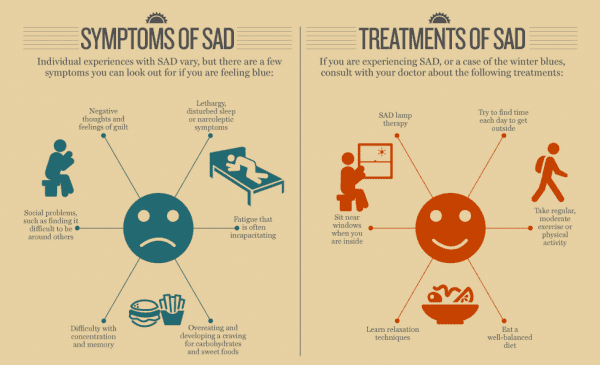Seasonal affective disorder (SAD) is a condition that affects our mental health and wellbeing during the winter months, causing many of us to feel low. With awareness of SAD on the rise, health experts at The Independent Pharmacy have conducted a study to see which areas are most concerned about seasonal affective disorder.
What is seasonal affective disorder?
Seasonal affective disorder (SAD) is a mood disorder that causes people to experience depression at specific times of the year. It’s most commonly associated with the winter months (November-February) and is often referred to as ‘winter depression’.
This is because it’s believed that SAD is caused by a lack of sunlight, with the autumn and winter seasons featuring significantly shorter days. Reduced exposure to sunlight is thought to influence the body’s production of melatonin, a hormone that induces sleepiness, and can lead to a decreased level of vitamin D.
Vitamin D, often referred to as the ‘sunshine vitamin’, helps ward off low moods and support the body’s nervous system. It’s commonly believed that a reduced level of vitamin D can significantly enhance the symptoms of SAD, leading to much greater suffering.
SAD often causes sufferers to exhibit symptoms of depression including trouble waking up in the mornings, reduced energy levels, increased irritability, and a persistently-low mood. You can find other symptoms and tips for treating SAD in this seasonal affective disorder guide.
Which European country is the most concerned about SAD?
The analysis looked at Europe’s 20 largest countries (based on population size) to determine which countries are most concerned about seasonal affective disorder. The 10 most concerned countries are as follows:
| Country | Level Of Concern (1 = Highest) from SAD Search Volume | Average Daylight Hours in January |
| UK | 1 | 8.5 |
| Sweden | 2 | 7 |
| Ukraine | 3 | 8.5 |
| Germany | 4 | 8.25 |
| Russia | 5 | 7.75 |
| Italy | 6 | 10.5 |
| Poland | 7 | 8.25 |
| Iceland | 8 | 5.5 |
| Portugal | 9 | 9.75 |
| Hungary | 10 | 9 |
The UK emerged as the most concerned nation, with a total average monthly search volume of 12,200 for key SAD terms including “seasonal affective disorder symptoms”, “what is sad?” and “how to treat seasonal affective disorder?”.
Since SAD is linked with a lack of sunlight that provides vitamin D and tends to prompt positivity, The Independent Pharmacy went a step farther by cross-referencing the search volume for key SAD terms with the average daylight hours seen in each country in January. The goal was to check for correlations between concern about SAD and the lack of sunlight.
Of the 10 countries where people are most concerned about SAD, seven also rank among the 10 countries with the least daylight in January, ranging between just 8.5-5.5 average daylight hours a day in January. This suggests a strong link between a reduction in daylight hours and research regarding seasonal affective disorder.
Which UK city is the most concerned about SAD?
Bringing the analysis into home territory, the research also revealed which UK city is the most concerned about seasonal affective disorder:
| UK City | Level of Concern (1 = high) from SAD Search Volume |
| London | 1 |
| Manchester | 2 |
| Dublin | 3 |
| Bristol | 4 |
| Edinburgh | 5 |
| Birmingham | 6 |
| Glasgow | 7 |
| Liverpool | 8 |
| Cardiff | 9 |
| Newcastle | 10 |
The capital city of London emerged as the UK city most worried about SAD, but there’s little to separate it from Manchester, another city with a great deal of SAD-related concern.
There’s a much bigger gulf to be found elsewhere, though, with London markedly ahead of Newcastle, the city rounding out the top 10. With southern cities featuring in the top five and northern cities appearing towards the bottom of the list, might it be that southern cities, in general, are more concerned about SAD than their northern counterparts?
Pharmacist Scott McDougall (MPharm), co-founder of The Independent Pharmacy, comments:
“Seasonal affective disorder (SAD) is a very real and potentially-debilitating disorder, and I’m pleased to see from this study that awareness of the condition is increasing. SAD is clearly more prevalent in the winter months, thought to be incited by the lack of sunlight, and the research here shows a clear correlation between a decrease in hours of daylight and an increase in searches showing curiosity or concern regarding SAD.”
“SAD shares many of its symptoms with depression, the primary ones being a loss of interest in everyday activities, a persistently-low mood, feelings of worthlessness, guilt or despair, a lack of energy, and a tendency to sleep for longer than is usual.”
“There are four main options for treating the symptoms of SAD: lifestyle steps (e.g. exercise), light therapy (often with SAD lamps), counselling (including cognitive behavioural therapy), and antidepressants (such as selective serotonin reuptake inhibitors).”
“As we push through the winter of 2022, it’s important to look out for our loved ones, particularly those who may be suffering from SAD. After all, January has the unwelcome reputation of being ‘the most depressing month’ — and we’ve seen some reasons why.”
“It’s true that some reasons don’t hold up, admittedly. Part of that reputation stems from the dubious contention that ‘Blue Monday’, the third Monday of the year, is inevitably the most depressing day of the year (as claimed by Sky Travel, a UK travel company, back in 2005).”
“But even if ‘Blue Monday’ is meaningless, the threat posed by January must not be ignored. Up to 3% of the UK population suffers from SAD, after all. Let’s do what we can to address it.”
To see the full survey click on the following link: https://www.theindependentpharmacy.co.uk/ or the guide page at https://www.theindependentpharmacy.co.uk/vitamins-minerals/guides/seasonal-affective-disorder-vitamin-d.

| [donate]
| Help keep news FREE for our readersSupporting your local community newspaper/online news outlet is crucial now more than ever. If you believe in independent journalism,then consider making a valuable contribution by making a one-time or monthly donation. We operate in rural areas where providing unbiased news can be challenging. |

















